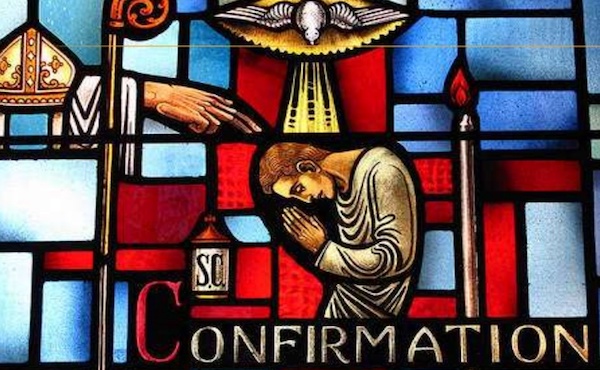
Confirmation
Confirmation is about renewing one’s Baptismal promises
before receiving Communion for the first time.
Most Catholics aged over 40 would have been Confirmed at around the age of 12 or 13, well after their First Communion. Some people may believe that this is “how it was always done” and wonder why the familiar pattern has recently changed, to Baptism – Confirmation – First Communion.
In the early Church, Initiation consisted of Immersion in water, Laying on of hands and Anointing with Chrism by the Bishop, and finally joining the community for the first time at the Lord’s Table, all of which happened at the one ceremony.
For historical reasons, Confirmation became separated from Baptism but the order of the sacraments of initiation remained the same – Baptism, then Confirmation, then finally Communion (or Eucharist). Confirmation was always about renewing one’s Baptismal promises before receiving Communion for the first time.
In the early 1900s, Pope Pius X, lowered the age for First Communion from around 12, as it was then, to the “age of reason”, around 7 years of age. But Confirmation was left where it was, so the order of Sacraments of Initiation were switched around. It is interesting to think that the pattern, which is so familiar to many, that of Baptism – First Communion – Confirmation, was actually, an accident of history!
Because it was no longer the Sacrament which linked Baptism and First Communion, Confirmation gradually took on new meanings, including the “sacrament of adulthood”, becoming “a soldier of Christ”, and even “signing the pledge” (a promise not to drink alcohol until a certain age, or even for life!).
The new Rite of Confirmation issued in 1971 put Confirmation back where it belongs, as the link between Baptism and First Communion. Confirmation is the Sacrament which “seals” or “reaffirms” our Baptism before we take the final step in becoming a full member of the Catholic Church – sharing in Holy Communion for the first time.
In recent years many Dioceses in Australia and other parts of the world have responded to the Church’s call to restore Confirmation to its proper place and meaning.
Parishes are responsible for preparing their younger members to complete their initiation through Confirmation and Communion, which are usually celebrated at the same Mass or in the same week.
Contact the Parish Centre for further information about preparation for these Sacramental programs.
Frequently Asked Questions.
At what age are children Confirmed?
Children who are Baptised as infants may be considered eligible for Confirmation and First Communion from about the age of seven years.
Confirmation Name.
Choosing a Confirmation name has never been an official part of the Sacrament, although it has been a popular custom in many places in the past.
In the early Church, those people preparing to become Christians who had names associated with Paganism took on a “new name” as a sign of the “new stage of life they were entering”. It is hard to imagine any name that these days would be considered “Pagan”. Our given names are a very important part of our identity. Parents usually put a lot of thought into choosing a child’s name, so it seems strange for the Bishop or Priest to call a young person by a different name at Confirmation.
If a Confirmation name is chosen, it should be used in addition to the Baptismal name, not in place of it.
Of course, it is still appropriate for young people preparing for Confirmation to research a Saint who will serve as a model for Christian living.
Who should we choose as Confirmation Sponsors?
Because Confirmation is a renewing of the promises made at Baptism, the Church recommends that a child’s Godparent take on the role of Sponsor for Confirmation. Sponsors should

Contact the Parish Centre for further information.
